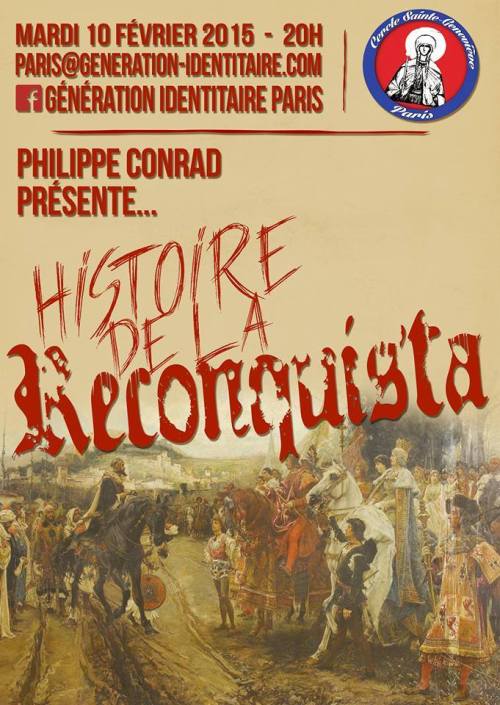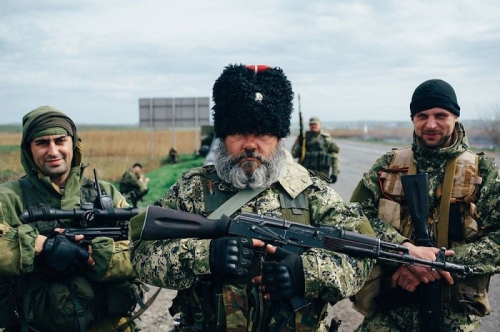En un ensayo sobre el tantrismo la escritora Marguerite Yourcenar[i] reseñaba una de las obras monumentales de Julius Evola titulada Lo Yoga della Potenza. La académica francesa catalogaba al filósofo y orientalista italiano, profesor de las universidades de Florencia y de Milán, como "un erudito genial" ateniéndose a sus obras más ponderadas. Pero aunque el barón Evola fue un erudito genial, ciertamente no fue un erudito inmaculado. Evola tuvo un pasado fascista y fue "uno de esos italianos germanizados con no sé sabe qué clase de obsesiones gibelinas", un hombre "mucho más fascinado por el poder que por el conocimiento o el amor" que estaba poseído por un "titanismo prometeico más o menos espiritualizado"[ii]. Su Rivolta contro il mondo moderno (el título de otro de sus libros), por muy justificada que esa rebelión en parte esté, "acabó arrastrándolo a unos parajes aún más peligrosos que aquellos que creía abandonar". En sus libros asoman un puñado de vicios intelectuales, esperables en alguien con semejante orientación, que enturbian una y otra vez incluso sus trabajos más brillantes. La propia Yourcenar señaló casi todos esos vicios: "el concepto de raza elegida que en la práctica conduce al nazismo"; "una avidez enfermiza por los poderes supranormales, que lo lleva a aceptar sin control los aspectos más materiales de la aventura espiritual"; "el paso lamentable de la noción de poderes intelectuales y místicos a la de poder puro y simple"; "un sueño de dominación aristocrática y sacerdotal que no sabemos si correspondió a una edad de oro del pasado, pero del que en nuestro tiempo hemos visto caricaturas grotescas y atroces"; a lo que habría que añadir un desprecio sumario hacia lo femenino que lo lleva a proclamar la deficiencia interior de la mujer y la incapacidad femenina para la vida humana superior. No obstante, y a pesar de todo esto -que no debe olvidarse nunca cuando uno se acerca a la obra de Evola– también es cierto que sus mejores libros, tomados con las debidas cautelas, aportan abundante materia para la reflexión. Huellas de ellos pueden encontrarse en las obras de no pocos autores contemporáneos que, sin embargo, omiten cuidadosamente la fuente por considerarla innombrable y maldita. Adolfo Morganti, en el ámbito del orientalismo, y Alain de Benoist, en el de la filosofía, fueron los primeros que se atrevieron a remitir a las obras de Evola abiertamente. Como señaló Morganti, "después de años de que el pensamiento evoliano hubiera sido o demonizado grotescamente o ensalzado como un improbable evangelio, había que romper son el muro de las ideologías y proceder al debate de las ideas y a un análisis crítico digno de ese nombre"[iii].
En este sentido Cavalgar el tigre ha sido una de sus obras más interesantes e influyentes[iv]. Su punto de partida es la ciclología de las tradiciones culturales indoeuropeas, que observa un descenso progresivo de la civilización desde una 'edad de oro' primordial hasta una 'edad de hierro' donde se liberan todos los mecanismos disolutorios para dar paso a la liquidación del ciclo. Para esa concepción del tiempo –propia de nuestra cultura clásica y presente todavía hoy en el pensamiento hindú- nuestra época, lejos de ser la culminación de un tiempo lineal de progreso continuo, es el momento final de una era de disolución. En tal contexto temporal Evola señala que hay un cierto tipo humano "que, aun estando comprometido con el mundo actual, no pertenece interiormente a él, no contempla la posibilidad de ceder ante él y se siente, por su esencia, de una clase diferente a la mayor parte de sus contemporáneos". El lugar natural de este tipo humano sería "el mundo de la Tradición", entendiendo por tal cosa las civilizaciones y sociedades regidas por principios transcendentes. Puesto que lo que ha terminado por prevalecer en el mundo actual es la exacta antítesis de eso, Evola observa que los Hombres diferenciados a los que se refiere se hallan "de pie en medio de las ruinas". Para ellos hace una radiografía del mundo actual tan detallada como demoledora.
Evola empieza analizando la disolución del orden moral. El primer capítulo –titulado "En un mundo donde Dios ha muerto"- hace referencia al nihilismo hoy reinante en Occidente y ya anunciado por Nietzsche. "La muerte de Dios", dice Evola, "es una imagen que sirve para caracterizar todo un proceso histórico. Expresa el descreimiento hecho realidad cotidiana", la ruptura con la Tradición que en el Occidente actual tiene el carácter de un hecho consumado y tal vez irreversible. Evola observa que en este proceso de desacralización el hecho primario es una ruptura ontológica: las referencias reales a la Transcendencia han desaparecido de la vida humana. Todos los desarrollos del nihilismo están virtualmente contenidos en este hecho. Primero fue la aparición de la llamada 'moral autónoma', fundada sobre la mera autoridad de la razón independiente de todo criterio transcendente. Al haber perdido sus raíces –el lazo efectivo y original del Hombre con una dimensión supramaterial- esta moral ya no tiene una base invulnerable y la crítica puede destruirla fácilmente. Tras ella aparece, en un segundo momento, la ética utilitaria o social. "Al haber renunciado a todo fundamento absoluto e intrínseco del bien y del mal, se pretende justificar lo que queda de norma moral por lo que recomiendan al individuo su interés y la búsqueda de su tranquilidad material en la vida social". Esta ética ya no tiene carácter interiormente normativo o imperativo y todo se reduce a amoldarse a los códigos de la sociedad, que reemplazan a la ley transcendente derribada. Es un conformismo fundado "sobre el interés, la cobardía, la hipocresía y la inercia". Además, como ya no existe ningún lazo interior, "cualquier acto o comportamiento se vuelven lícitos cuando puede evitarse la sanción exterior, jurídico-social, o cuando uno es indiferente a ella". Hay, por tanto, dos fases. La primera es una rebelión metafísica que tiene consecuencias morales. En la segunda fase "hasta los motivos que habían justificado y alentado la rebelión desaparecen, volviéndose ilusorios para un nuevo tipo de Hombre. Aquí estamos ya en la fase específicamente nihilista, cuyo tema dominante es el sentido de lo absurdo y de la irracionalidad de la condición humana". Es lo que Nietzsche llamó "la miseria del Hombre sin Dios": la existencia parece perder todo significado y toda meta.
Todos los imperativos, todos los valores morales, todos los lazos y los apoyos se desmoronan. "La existencia es abandonada a sí misma en su realidad desnuda sin ningún punto de referencia fuera de ella que pueda darle sentido a los ojos del Hombre".
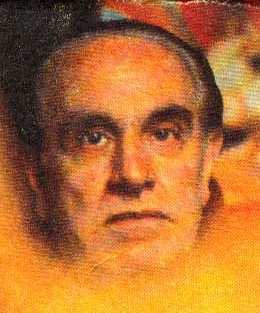 Evola hace notar que existe una corriente de pensamiento y una historiografía cuya característica es presentar el proceso anterior, al menos en sus primeras fases, como una conquista positiva. "Desde el siglo de las luces y cierto liberalismo", dice, "hasta el historicismo inmanentista, primero idealista, luego materialista y marxista, estas fases de disolución han sido interpretadas y exaltadas como una emancipación del Hombre, un progreso y un verdadero humanismo". En los tiempos en que nosotros vivimos, señala Evola, la ruptura metafísica y moral ha pasado ya al plano existencial. Hoy "una buena parte de la humanidad occidental encuentra normal que la existencia esté desprovista de todo verdadero significado y que no deba ser ligada a ningún principio superior, aunque se las ha arreglado para vivirla de la forma más soportable y menos desagradable posible. Sin embargo, esto tiene como contrapartida inevitable una vida interior cada vez más reducida, inestable y huidiza, así como la desaparición de toda rectitud y fuerza moral". Un sistema de anestésicos y compensaciones (el sexo banalizado, el alcohol, las drogas, las diversiones, el consumismo, los medios de masas) trata de suplir y tapar la falta de significado y de valor de una vida abandonada a sí misma. Sin embargo, cuando dicho entramado se tambalea por alguna razón aparece "la náusea, el asco, el vacío y el absurdo de toda esta nueva civilización materialista impuesta por toda la Tierra". En aquellos cuya sensibilidad es más aguda se constatan diversas formas de traumatismo interior y se ven aparecer estados de degradación y alineación existenciales. Especialmente significativa por lo que tiene de signo de los tiempos es la situación de la juventud 'perdida' o 'quemada' de hoy.
Evola hace notar que existe una corriente de pensamiento y una historiografía cuya característica es presentar el proceso anterior, al menos en sus primeras fases, como una conquista positiva. "Desde el siglo de las luces y cierto liberalismo", dice, "hasta el historicismo inmanentista, primero idealista, luego materialista y marxista, estas fases de disolución han sido interpretadas y exaltadas como una emancipación del Hombre, un progreso y un verdadero humanismo". En los tiempos en que nosotros vivimos, señala Evola, la ruptura metafísica y moral ha pasado ya al plano existencial. Hoy "una buena parte de la humanidad occidental encuentra normal que la existencia esté desprovista de todo verdadero significado y que no deba ser ligada a ningún principio superior, aunque se las ha arreglado para vivirla de la forma más soportable y menos desagradable posible. Sin embargo, esto tiene como contrapartida inevitable una vida interior cada vez más reducida, inestable y huidiza, así como la desaparición de toda rectitud y fuerza moral". Un sistema de anestésicos y compensaciones (el sexo banalizado, el alcohol, las drogas, las diversiones, el consumismo, los medios de masas) trata de suplir y tapar la falta de significado y de valor de una vida abandonada a sí misma. Sin embargo, cuando dicho entramado se tambalea por alguna razón aparece "la náusea, el asco, el vacío y el absurdo de toda esta nueva civilización materialista impuesta por toda la Tierra". En aquellos cuya sensibilidad es más aguda se constatan diversas formas de traumatismo interior y se ven aparecer estados de degradación y alineación existenciales. Especialmente significativa por lo que tiene de signo de los tiempos es la situación de la juventud 'perdida' o 'quemada' de hoy.
Señala Evola que una de las principales coberturas evasivas, uno de los anestésicos más eficaces del nihilismo occidental es el mito económico-social en sus dos vertientes: el bienestar consumista y el funcionarismo marxista. Capitalismo y marxismo participan del mismo espejismo: "creer en serio que la miseria existencial se reduce a sufrir indigencia material y que, en consecuencia, la primera debe desaparecer automáticamente si se elevan las condiciones materiales de la existencia". Evola considera que la verdad es más bien la opuesta: miseria espiritual y pobreza material carecen de relación y la felicidad y la plenitud humana tienen poco que ver con la abundancia material. Es un hecho que las vidas más profundas son a menudo, si no pobres, sí desde luego austeras (incluso en medio de la riqueza), porque un clima de facilidad debilita la virtud más alta e impide que el Hombre se pruebe y se discipline a sí mismo. "El verdadero significado del mito económico-social, sea cual fuere su variedad", dice Evola, "es el de un medio de anestesia interior tendente no sólo a eludir el problema de una existencia privada de todo sentido, sino a consolidar todas las formas de esta fundamental ausencia de sentido en la vida del Hombre moderno". Para Evola el marxismo y sus derivados 'progresistas' son "el estupefaciente más mortífero de todos los administrados hasta ahora a una humanidad desarraigada", estupefaciente que va acompañado de "una lobotomía psíquica tendente a neutralizar metódicamente, desde la infancia, toda forma de sensibilidad y de intereses superiores y cualquier modo de pensar que no se exprese en términos económico-sociales". En cuanto al sistema consumista, Evola dice que "destruye todo valor superior de la vida y de la personalidad", porque el individuo consumista acaba por considerar absurda cualquier renuncia al bienestar en nombre de valores más altos y se pliega gustoso a los condicionamientos anestesiantes del sistema. Puesto que en Occidente la 'clase obrera' ha entrado con gran fruición en el sistema consumista y en el modo de vida burgués, los derivados marxistas abandonan la revolución anticapitalista y llaman ahora a una suerte de "contestación global", irracional, anarquizante y privada de referentes superiores, en nombre del Tercer Mundo o de toda clase de minorías marginales.
Tanto el sistema como sus antagonistas tienen un carácter nihilista que no hace sino confirmar el nihilismo general de nuestra época.
Dos son los tipos humanos que ha producido el nihilismo contemporáneo. Evola los llama "el Hombre objeto" y el "nihilista activo". El primero -el tipo más frecuente- se pliega a los procesos de disolución en marcha de modo pasivo. O bien se adapta a una vida desprovista de sentido con anestésicos y sucedáneos, agarrándose a las formas supervivientes de convención y seguridad burguesas, o bien se entrega a formas de vida desordenadas y de revuelta anarcoide. El nihilista activo de corte nietzscheano, tipo mucho más restringido, está convencido, sin embargo, de que la actual rebelión contra la Transcendencia es el camino correcto, hace apología de ella y considera que el desastre actual es sólo el resultado de no haber sabido estar a la altura de las nuevas circunstancias sin Dios. Evola analiza entonces el tema de 'la muerte de Dios': para él no es la Divinidad metafísica, es el Dios teísta, lo que ha muerto, el Dios que es una proyección de los valores sociales dominantes o un apoyo para las debilidades humanas. Es el conjunto de conceptos que el cristianismo oficial ha considerado como esenciales e indispensables de toda religión 'verdadera' lo que ha muerto: "el Dios personal del teísmo, cierta ley moral con paraísos e infiernos, la concepción restringida de un orden providencial y de un finalismo moral del mundo y la fe que reposa sobre una base principalmente emotiva, dogmática y anti-intelectual. No es más que el Dios concebido como centro de gravedad de todo este sistema quien ha sido golpeado, un Dios que había terminado por servir de opio o contrapartida a la pequeña moral con que el mundo burgués sustituyó a la gran moral antigua. Pero el núcleo esencial, representado por las doctrinas metafísicas, permanece intacto para quien sepa comprenderlas y vivirlas, inaccesible a todos los procesos nihilistas, a toda disolución". Evola considera que el cristianismo ha facilitado la acción de las fuerzas de disolución en Occidente por haber liquidado todos los intentos metafísicos que dentro de él se han hecho. La irracionalidad de sus dogmas y la falta de un corpus sapiencial superior capaz de contener el derrumbamiento han hecho al cristianismo particularmente vulnerable a los embates de la crítica racional y del libre pensamiento.
Cuando la disolución se ha asentado en el orden moral, la enfermedad sigue con la infección de la persona. Evola distingue entre 'persona' e 'individuo'. La persona es "lo que el Hombre representa concreta y sensiblemente en el mundo y en su circunstancia, pero siempre como una forma de expresión y manifestación de un principio superior que debe ser reconocido como el verdadero centro del ser y sobre el que se sitúa el yo. El Hombre en tanto que persona tiene forma, es él mismo y se pertenece a sí mismo, y en esto se diferencia del individuo". En esto y en que la persona "no está cerrada hacia lo Alto". "La noción de individuo", por contra, "es la de una unidad abstracta, informe, numérica, sin cualidades propias y nada que lo diferencie verdaderamente". El individuo pertenece al reino de la cantidad y es un ego disociado de todo principio transcendente.
Evola vaticina que la crisis de los valores del individuo en el mundo moderno está destinada a ser general e irreversible. El materialismo, el mundo de las masas, las megaurbes modernas, la técnica, la mecanización, las fuerzas elementales despertadas y controladas por procesos objetivos, los efectos existenciales de catástrofes colectivas (las guerras totales o el megaterrorismo con sus frías destrucciones, por ejemplo), todo esto golpea mortalmente al individuo y reduce cada vez más la validez de los valores burgueses. Del individuo se desemboca así en algo todavía más bajo, el tipo de Hombre vacío, repetido en serie, producto multiplicable e insignificante, que corresponde a la vida uniformada actual. Con este tipo de Hombre vacío y serial llega "una nueva barbarie" y un "ideal animal" de vida. Un ideal basado en "el bienestar biológico, la comodidad y la euforia optimista que enfatiza lo que no es más que lozanía, juventud, fuerza física, seguridad y éxito materiales, satisfacción primitiva de los apetitos del vientre y del sexo, vida deportiva... y cuya contrapartida es una atrofia de todas las formas superiores de sensibilidad y de interés intelectual". En esta nueva barbarie y en este ideal animal se incluyen también todos los contestatarios primitivistas que reclaman una 'vuelta a la naturaleza', a la 'Madre Tierra'. Esta supuesta contestación no es sino una forma de regresión. Evola defiende que el Hombre ni es un animal ni ha tenido nunca un estado natural. El Hombre, desde el principio, "ha sido situado en un estado por encima de la naturaleza del que a continuación ha caído", de modo que cuando pretende volverse 'natural' (esto es, animal) en realidad se desnaturaliza.
Disuelta la moral y disuelto el individuo, también se disuelve el conocimiento. Evola se ocupa por extenso de la ciencia positiva y matemático-experimental propia de la modernidad. Esta ciencia no tiene para él valor de conocimiento en el sentido verdadero de ese término, pues se reduce a "una voluntad de poder aplicada a las cosas y a la naturaleza". Para Evola "la ciencia moderna, por una parte conduce a una prodigiosa extensión cuantitativa de los datos relativos a dominios antes inexplorados u olvidados, pero por otra parte no hace penetrar al Hombre en el fondo de la realidad, sino que incluso lo aleja de ella, lo vuelve aún más ajeno a ella". La naturaleza, en su profundidad, permanece cerrada al Hombre y es aún más misteriosa que antes: sus misterios simplemente han sido recubiertos y la mirada humana se ha distraído con las realizaciones espectaculares de los dominios técnicos industriales, dominios "donde no se trata de conocer el mundo, sino de transformarlo conforme al interés de una humanidad convertida exclusivamente en terrestre, como quería Marx". Simultáneamente el conocimiento directo y viviente, la penetración de la intuición intelectual o de la visión mística, "el único conocimiento que importaba a la humanidad no bastardeada", se rechaza hoy por 'no científico'.
Para Evola la concepción del mundo que tiene la ciencia moderna es esencialmente profanadora y ese mundo desacralizado por el saber científico se ha convertido en un elemento existencial constitutivo del Hombre moderno. A través de la instrucción obligatoria se le ha llenado la cabeza de nociones científicas positivistas "no pudiendo adquirir para todo lo que le rodea más que una mirada sin alma que se convierte desde entonces en destructora". El trasfondo efectivo del progreso científico-técnico actual, convertido en la nueva religión de la modernidad, es para el autor el estancamiento y la barbarie interiores. Evola señala que ese progreso "no le reporta nada al Hombre como tal": no le otorga ni conocimiento transcendente, ni potencia interior, ni una norma de acción de más altura moral. En el plano de la acción la ciencia moderna "pone a disposición del Hombre un conjunto prodigioso de medios sin resolver en absoluto el problema de los fines". Además, la ciencia se ha convertido en un proceso autónomo y fragmentado en cada vez más estrechas especializaciones al que "ninguna instancia superior es capaz de imponer un límite y de imprimir dirección, control o freno". Por ello "a menudo se tiene la impresión de que el desarrollo técnico-científico desborda al Hombre y le impone frecuentemente situaciones inesperadas, difíciles y llenas de incógnitas". Las formas de potencia exterior y mecánica de sus bombas, sus cohetes o su revolución tecnológica dejan, en cualquier caso, invariable al Hombre en sí, que sigue tan preso o más que antes de sus debilidades, sus bajas pasiones, su confusión y sus miedos. El Hombre actual no eleva su estatura moral, intelectual o espiritual por ser capaz de ir en cohete hasta la Luna, de producir seres humanos en laboratorio o de matar a miles de criaturas en cinco minutos gracias a la técnica.
La misma degradación que afecta al conocimiento se encuentra hoy, según Evola, en la cultura. La cultura occidental está neutralizada en su influjo, dividida en dominios particulares sin unidad orgánica y se halla privada de todo carácter objetivo, participando de esta forma en los procesos disolutorios de la época. Evola considera que la antítesis decretada entre cultura y política es "una de las manifestaciones más típicas de esa neutralización de la cultura". El contrario normal y fecundo de esta situación no es, para Evola, una cultura al servicio del poder y de la ideología en el sentido degradado de hoy, sino la existencia de una idea axial, de un símbolo elemental y central de una civilización dada, "que manifiesta su fuerza y ejerce una acción paralela y a menudo invisible tanto sobre el plano político (con todos los valores, no sólo materiales, que deberían referirse a un verdadero Estado), como sobre el plano del pensamiento, de la cultura y de las artes". Para Evola esa vieja idea axial hoy perdida es en el caso de la civilización occidental el "ideal del Imperio", ideal que se forjó en el mundo antiguo y medieval y que países como España contribuyeron a mantener en los Siglos de Oro. Evola entiende por tal cosa una gran organización política más allá de particularismos etnicistas y territoriales, organizada con criterios de excelencia y vertebrada por los valores transcendentes característicos de nuestra civilización.
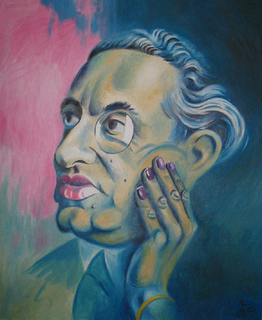 Al analizar la situación del arte moderno, Evola subraya sus tendencias morbosas e intimistas, que dan la espalda al plano sobre el que actúan las grandes fuerzas históricas y políticas y se retiran al mundo de la subjetividad privada del artista no dando valor más que a lo psicológico y a lo formalmente 'interesante'. Joyce, Proust o Gide son, en la literatura, ejemplos acabados de esta tendencia. En ocasiones a esta orientación se asocia la idea del 'arte puro', esto es, del mero formalismo rodeando a un contenido más o menos insignificante. Las innumerables vanguardias e ismos no tienen mucho más valor, afirmación que resulta significativa en la pluma de alguien como Evola, que fue una de las figuras señeras del dadaísmo pictórico italiano. El significado de estas vanguardias "se reduce a una revuelta estéril, reflejo del proceso general de disolución. Reflejan el estado de crisis, pero no aportan nada constructivo, estable o duradero". Su recorrido, además, es corto. Pronto acaban convertidas en un nuevo 'academicismo', una nueva convención, y entran como un producto de consumo más en los circuitos comerciales. En el fondo el arte de hoy, separado de todo contexto orgánico y necesario, se ve reducido al absurdo, convertido en un artículo de lujo para parásitos ociosos. "Si se consideran objetivamente los procesos en curso", observa Evola, "se siente nítidamente que el arte ya no tiene porvenir, que su posición es cada vez más marginal con respecto a la existencia y que su valor se reduce al de un artículo de gran lujo". Al asomarse a la literatura, el panorama no es mejor. "Su fondo constante es el fetichismo de las relaciones humanas, de los problemas sentimentales, sexuales o sociales de individuos sin importancia". Se ha impuesto un realismo inferior, corrosivo y derrotista, denuncia Evola, en el que "directa o indirectamente se mina todo ideal, se hace mofa de todo principio y se reducen los valores estéticos, lo justo, lo verdaderamente noble y digno a simples palabras; y todo ello sin obedecer siquiera a una tendencia declarada". Frente a este realismo inferior Evola postula un realismo positivo que afirma la existencia de valores "que para el tipo humano diferenciado no se reducen a ficciones ni fantasías, sino que tienen el valor de realidades absolutas. Entre éstas figuran el coraje espiritual, el honor, la rectitud, la veracidad o la fidelidad. Una existencia humana que ignora esto no es plenamente real, es infrarreal. Para el Hombre diferenciado, a pesar de la disolución presente, estos valores siguen siendo intocables".
Al analizar la situación del arte moderno, Evola subraya sus tendencias morbosas e intimistas, que dan la espalda al plano sobre el que actúan las grandes fuerzas históricas y políticas y se retiran al mundo de la subjetividad privada del artista no dando valor más que a lo psicológico y a lo formalmente 'interesante'. Joyce, Proust o Gide son, en la literatura, ejemplos acabados de esta tendencia. En ocasiones a esta orientación se asocia la idea del 'arte puro', esto es, del mero formalismo rodeando a un contenido más o menos insignificante. Las innumerables vanguardias e ismos no tienen mucho más valor, afirmación que resulta significativa en la pluma de alguien como Evola, que fue una de las figuras señeras del dadaísmo pictórico italiano. El significado de estas vanguardias "se reduce a una revuelta estéril, reflejo del proceso general de disolución. Reflejan el estado de crisis, pero no aportan nada constructivo, estable o duradero". Su recorrido, además, es corto. Pronto acaban convertidas en un nuevo 'academicismo', una nueva convención, y entran como un producto de consumo más en los circuitos comerciales. En el fondo el arte de hoy, separado de todo contexto orgánico y necesario, se ve reducido al absurdo, convertido en un artículo de lujo para parásitos ociosos. "Si se consideran objetivamente los procesos en curso", observa Evola, "se siente nítidamente que el arte ya no tiene porvenir, que su posición es cada vez más marginal con respecto a la existencia y que su valor se reduce al de un artículo de gran lujo". Al asomarse a la literatura, el panorama no es mejor. "Su fondo constante es el fetichismo de las relaciones humanas, de los problemas sentimentales, sexuales o sociales de individuos sin importancia". Se ha impuesto un realismo inferior, corrosivo y derrotista, denuncia Evola, en el que "directa o indirectamente se mina todo ideal, se hace mofa de todo principio y se reducen los valores estéticos, lo justo, lo verdaderamente noble y digno a simples palabras; y todo ello sin obedecer siquiera a una tendencia declarada". Frente a este realismo inferior Evola postula un realismo positivo que afirma la existencia de valores "que para el tipo humano diferenciado no se reducen a ficciones ni fantasías, sino que tienen el valor de realidades absolutas. Entre éstas figuran el coraje espiritual, el honor, la rectitud, la veracidad o la fidelidad. Una existencia humana que ignora esto no es plenamente real, es infrarreal. Para el Hombre diferenciado, a pesar de la disolución presente, estos valores siguen siendo intocables".
La música tampoco escapa al clima imperante. En el terreno de la música culta la disolución ha seguido dos vías: la tecnicidad fría y cerebral del dodecafonismo y la música serial y una inmersión en lo físico que toma a las cosas y los impulsos elementales como temas inspiradores (iniciada con el impresionismo francés y la música nacionalista). Últimamente se ha llegado ya a una especie de "música glaciar" con composiciones "cuya extrema abstracción formal es análoga a las puras entidades algebraicas de la física más reciente o, en otro terreno, a cierto surrealismo. Son fuerzas sonoras liberadas de las estructuras tradicionales que empujan hacia un meandro tecnicista que sólo el álgebra pura de la composición preserva de una completa disolución en lo amorfo, por ejemplo en la intensidad de los timbres descarnados y atómicamente disociados". Fuera de la música culta, que por otra parte tiene un alcance cada vez más minoritario, la música folclórica ha desaparecido y lo que domina la esfera cotidiana son las diferentes variantes del pop, músicas elementales de diversión o distracción, a menudo vehículos idóneos para la transmisión de toda clase de influencias psíquicas negativas.
Disuelta la moral y el individuo, disueltos el conocimiento, la cultura y las artes, el dominio socio-político estalla igualmente. Entre todos los dominios de la vida moderna es el socio-político "aquel en el cual, por efecto de los procesos generales de disolución, aparece de una manera más manifiesta la ausencia de una estructura que posea el carisma de una verdadera legitimidad para ligarse a significados superiores". Señala Evola que en la época actual "no existe un Estado que pueda, por su propia naturaleza, reivindicar un principio de autoridad verdadera e inalienable" ni que pueda considerarse ajustado a una concepción transcendente de la política. Hoy sólo existen aparatos representativos y administrativos, no Estados que sean la encarnación de un ideal superior. No hay tampoco verdaderos estadistas, la clase dirigente actual no tiene ningún carisma, ninguna virtud superior. "Del mismo modo que ya no existe un verdadero Estado, tampoco existe un partido o un movimiento que se presente como defensor de ideales superiores por los que valga la pena luchar". "A pesar de la variedad de etiquetas", observa Evola, "el mundo actual de los partidos se reduce a un régimen de politicastros que juegan a menudo el papel de hombres de paja al servicio de intereses financieros, industriales o sindicales. Por lo demás la situación general es tal que incluso si existieran partidos o movimientos de otro tipo ya no tendrían ninguna audiencia en las masas desarraigadas, dado que estas masas sólo reaccionan positivamente a favor de quienes le prometen ventajas materiales y 'conquistas sociales'. Hoy en día en política sólo puede actuarse en el plano de las fuerzas pasionales y subintelectuales, fuerzas que por su misma naturaleza carecen de toda estabilidad. Sobre estas fuerzas se apoyan los demagogos, los dirigentes de masas, los fabricantes de mitos y los manipuladores de la opinión pública". Es por esto por lo que aunque hoy aparecieran líderes dignos de ese nombre –personas que apelasen "a fuerzas e intereses de otro tipo, que no prometieran ventajas materiales, que no consintieran en prostituirse o degradarse para asegurarse un poder efímero, precario e informe"-, estos líderes muy probablemente no tendrían ninguna influencia en la situación actual.
Pasando del dominio político al propiamente social, Evola observa que todas las unidades orgánicas de la sociedad se han disuelto o están en vías de hacerlo y lo que existe es esencialmente una masa inestable de individuos aislados contenidos por estructuras exteriores o movida por corrientes colectivas amorfas. Las 'jerarquías' existentes son meramente dinerarias y la excelencia no tiene ya ningún valor en el ordenamiento social. La institución familiar también está en manifiesta crisis, zarandeada entre los intentos de sabotaje por un lado y las reacciones moralizantes vacías y el conformismo burgués, por otro. Desde el punto de vista de Evola todo esto no es de extrañar: "la familia ha cesado desde hace tiempo de tener un significado superior y de estar cimentada por valores vivos de orden transcendente". El carácter orgánico y en cierto sentido heroico que ofrecía su unidad en otros tiempos se ha perdido, al igual que se ha desvanecido el último barniz residual de sacralidad. La familia moderna es para Evola una institución pequeño-burguesa, determinada por valores naturalistas, utilitarios, rutinarios, vulgares y en el mejor de los casos, sentimentales. La función fundamental de la familia, la procreación, se reduce hoy sencilla y groseramente a una continuidad de la sangre, no a la continuidad más esencial de un depósito espiritual e histórico y de una herencia de valores e ideales. "Por otra parte", se pregunta Evola, "¿cómo podría ser de otra forma si su jefe natural, el padre, es hoy en día casi un extraño, incluso físicamente, al estar preso del engranaje de la vida material de esta sociedad absurda? ¿Qué autoridad moral o espiritual puede revestir el padre si hoy es sólo una máquina de fabricar dinero?". Para colmo ahora esto mismo se puede decir también de la madre, convertida en otra máquina de fabricar dinero o en un individuo de vida frívola y mundana, incapaz en ambos casos de mejorar el clima interior de la familia y de ejercer sobre ella una influencia positiva. A la pérdida del prestigio paterno le sigue el distanciamiento o la rebeldía de los hijos y la ruptura, "cada día más nítida y brutal", entre las generaciones mayores y las jóvenes. Este corte de la continuidad espiritual entre las generaciones se ve agravado, además, por un ritmo de vida cada vez más rápido y desordenado.
La misma situación de derrumbamiento que se ve en la institución familiar afecta a la unión de hombre y mujer. Hoy se han hecho frecuentes en Occidente la sucesión frívola y atropellada de emparejamientos y de rupturas hasta el punto de que parece "una especie de prostitución o ayuntamiento libre legalizado". El matrimonio burgués –que tomaba sus bases de la concepción católica y puritana protestante del matrimonio– se ha venido abajo. Desde hace unas décadas esta convención burguesa "se ha estrellado contra la práctica corriente y contestataria del sexo libre" que reivindica la promiscuidad y "la superación de las inhibiciones y los tabúes represivos". Dentro de un marco igualmente naturalista y profano (el Occidente cristiano carece de modelos de matrimonio genuinamente sagrado) el péndulo se ha ido de un extremo a otro: de una visión del sexo pacata y atormentada a otra promiscua y burdelesca. El resultado es una de las características más llamativas de nuestro tiempo: el poder obsesivo y desequilibrado de los asuntos venéreos hasta el punto de que el sexo y cierto de tipo falsificado de mujer son los dos motivos dominantes de la sociedad actual. Como dice Evola, existe una especie de "intoxicación sexual crónica manifestada de mil maneras en la vida pública y las costumbres a través de un erotismo abstracto que lo impregna todo". En este clima se comercializan "espejismos de la sexualidad de masas" en forma de ídolos femeninos que son alimentados por la televisión, el cine, la prensa, las revistas ilustradas y el mundo del espectáculo y la moda. "La mayoría de estas mujeres 'fatales' de rasgos supuestamente fascinantes", señala Evola, "en realidad como personas tienen cualidades sexuales muy mediocres y decadentes, siendo su fondo existencial el de mujeres vulgares y neuróticas".
La pretendida 'liberación' sexual de nuestra época es, para el autor, una vulgar inversión. Señala Evola que habría verdadera liberación si se tomara conciencia de los aspectos auténticamente importantes del sexo, si se reaccionara contra las vulgaridades que obturan sus posibilidades más elevadas y si se tomara posición contra la fetichización de las relaciones interpersonales. Pero eso, evidentemente, no ocurre. Las verdaderas implicaciones de la presente 'liberación sexual' son para el autor muy otras: la entronización del "sexo disociado" que conduce "a una banalización y a un naturalismo de las relaciones entre hombre y mujer, a un materialismo y un inmoralismo expeditivo y fácil en un régimen donde faltan las condiciones más elementales para realizar experiencias sexuales de verdadero valor e intensidad". El sexo se convierte así en un sucedáneo más de los muchos que produce la vida moderna, usado como las drogas "para conseguir sensaciones exasperadas que ayuden a llenar el vacío de la existencia". Y esta conversión del sexo en sucedáneo dentro de una atmósfera de venerización abstracta y colectiva provoca una aguda despolarización de los sexos que convierte a la virilidad y la feminidad en sucedáneos también, descargándolas de la fuerza transcendente de la que cada una de ellas es portadora.
Como es lógico, en este clima general de disolución, la situación de las religiones es considerada igualmente lamentable. Para Evola un fenómeno típico de las fases terminales de una civilización es que "las religiones pierden su dimensión superior, se adormecen, se secularizan y dejan de cumplir su función original". Refiriéndose a la rama católica del cristianismo Evola señalaba en Gli uomini e le rovine, otro de sus libros, la lamentable falta de nivel de la que hoy se puede ser testigo: "el peso de las preocupaciones de carácter social y moralista es mucho mayor que el concedido a la vía sapiencial, la contemplación y la ascesis, puntos clave de toda forma superior de religiosidad. De hecho hoy las principales preocupaciones del catolicismo son un moralismo sexual pequeño-burgués y un paternalismo asistencial". Es entonces, con esta situación decadente de la religión regular, cuando aparece "un neo-espiritualismo evasivo, alienante, de compensación difusa, desarrollado fuera de las tradiciones regulares (incluso contra ellas) y sin la menor repercusión seria sobre la realidad". El uso bastardo que este neo-espiritualismo hace de ciertas doctrinas tradicionales de carácter interno lleva al descrédito de las mismas por la manera "deformada e ilegítima" en que por él son presentadas y propagadas.
Ante este clima general, todo esfuerzo de oposición frontal a las tendencias de la época es considerado inútil. Evola rechaza resueltamente la opción que consistiría en "apoyarse sobre lo que sobrevive del mundo burgués y defenderlo y tomarlo como base frente a las corrientes actuales de disolución y subversión más violentas, tras haber intentado reanimar esos restos con la ayuda de algunos valores más altos". Los valores burgueses, en realidad, son productos decadentes que para Evola no tienen mayor valor. La actitud existencial que preconiza será esa que el viejo adagio oriental denomina cabalgar el tigre. "Cuando un ciclo de civilización toca a su fin", escribe Evola, "es difícil obtener un resultado positivo oponiéndose directamente a las fuerzas en movimiento. La corriente es demasiado fuerte y uno sería arrastrado por ella. Lo esencial es no dejarse impresionar por la aparente omnipotencia de las fuerzas disolutorias de la época. Privadas de lazo con todo principio superior, estas fuerzas tienen, en realidad, un campo de acción limitado. Es preciso, pues, no dejarse hipnotizar por el presente ni por lo que nos rodea y contemplar las condiciones susceptibles de aparecer más tarde. La regla a seguir consistirá en dejar libre curso a las fuerzas de la época, permaneciendo firmes y dispuestos a actuar cuando el tigre, que no puede abalanzarse sobre quien lo cabalga, esté fatigado de correr". Se abandona, por tanto, la acción directa y se retira uno hacia posiciones más interiores.
Frente a la situación actual, sin embargo, no caben para Evola ni la desesperación ni el derrotismo. El Hombre diferenciado sabe que "cuando un ciclo termina, otro comienza, y el punto culminante del proceso disolutorio es también aquel en el cual se origina el enderezamiento en la dirección opuesta". Para un Hombre amante de la Transcendencia, dice Evola, el mundo actual resulta amargo y problemático, pero él sabe que no está aquí ni por un azar despiadado al que ha de resignarse con fe o con fatalismo, ni para librar una carrera de resistencia a fondo perdido. A ese tipo humano le corresponde la misión de velar en medio de la noche, en medio de las ruinas, y conservar la memoria de toda una herencia civilizatoria para que la continuidad con el pasado no se rompa. La vida es para él, en consecuencia, una aventura de importancia capital, cargada de sentido.
Evola señala, en fin, la esterilidad del 'mito de Oriente' en nuestras presentes circunstancias. "Entre quienes han reconocido la crisis del mundo moderno y han renunciado también a considerar a la civilización moderna como la civilización por excelencia, como el apogeo y la medida de cualquier otra, hay quienes han vuelto su mirada a Oriente, ya que allí ven subsistir una orientación tradicional y espiritual que desde hace tiempo ha dejado de ser en Occidente la base de organización efectiva de los diversos dominios de la existencia. Se han preguntado incluso si no podrían encontrar en Oriente puntos de referencia útiles para la reintegración de Occidente". Evola considera que si la mirada occidental al Oriente persigue contactos intelectuales y doctrinales esa búsqueda es legítima, aunque "al menos en parte podríamos encontrar ejemplos y referencias claras en nuestro propio pasado sin necesidad de recurrir a una civilización no occidental". Pero si lo que se persigue es la adopción de un marco existencial oriental "uno no puede hacerse ilusiones: Oriente sigue ahora la senda de degradación que nosotros hemos tardado varios siglos en recorrer. El 'mito de Oriente', fuera de los círculos minoritarios y aislados de quienes cultivan las disciplinas metafísicas, es por tanto falaz. El desierto crece y no hay ninguna otra civilización que pueda servirnos de apoyo. Debemos afrontar solos nuestros problemas".
En realidad, el autor insiste en una posibilidad que justifica el esfuerzo de mantener una perspectiva netamente occidental. Es el hecho de que si la fase final de la edad oscura ha arrancado antes entre nosotros, también podemos ser nosotros los primeros en superarla. Las demás civilizaciones han entrado en esta corriente más tardíamente y podrían hallarse en lo más agudo del proceso disolutorio cuando Occidente rebase el límite negativo y empiece a remontar. Nuestra civilización estaría, en ese caso, "cualificada para una nueva función de guía, muy diferente de la que ha realizado en el pasado con la civilización tecno-industrial y materialista, entonces ya periclitada, y cuyo único resultado ha sido la decadencia espiritual generalizada".
NOTAS
[i] Marguerite Yourcenar: El Tiempo, gran escultor, Madrid, Alfaguara, 1989.
[ii] César Martínez: "Metafísica del sexo de Julius Evola", Axis Mundi II, nº5, 1998.
[iii] Adolfo Morganti: "Julius Evola y el mundo budista italiano", en Julius Evola: La doctrina del despertar. El budismo y su finalidad práctica, Grijalbo, México DF, 1998.
[iv] Julius Evola: Cabalgar el tigre, Barcelona, Nuevo Arte Thor, 1987.
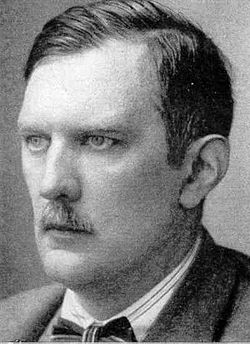 Moeller van den Bruck gilt heute als einer der maßgeblichen Köpfe der Konservativen Revolution. Viele Identitäre berufen sich, neben der Neuen Rechte, auch auf diese Strömung, was Moeller ins Zentrum des Interesses rücken sollte. Einem breiteren Publikum ist er heute nur durch seine Schrift „Das dritte Reich“ bekannt, die (mit und über Dietrich Eckhart) titelgebend für das NS-Reich werden sollte. Doch damit tut man ihm Unrecht! Moeller war und ist viel mehr als nur „Stichwortgeber“ für den NS. In ihm, seinem Denken und Werdegang zeichnet sich hingegen die große Tragödie um die konservativ-revolutionären „Denker“ und die national-sozialistischen „Macher“ so deutlich ab, das wir auch heute noch viel daraus lernen können.
Moeller van den Bruck gilt heute als einer der maßgeblichen Köpfe der Konservativen Revolution. Viele Identitäre berufen sich, neben der Neuen Rechte, auch auf diese Strömung, was Moeller ins Zentrum des Interesses rücken sollte. Einem breiteren Publikum ist er heute nur durch seine Schrift „Das dritte Reich“ bekannt, die (mit und über Dietrich Eckhart) titelgebend für das NS-Reich werden sollte. Doch damit tut man ihm Unrecht! Moeller war und ist viel mehr als nur „Stichwortgeber“ für den NS. In ihm, seinem Denken und Werdegang zeichnet sich hingegen die große Tragödie um die konservativ-revolutionären „Denker“ und die national-sozialistischen „Macher“ so deutlich ab, das wir auch heute noch viel daraus lernen können.



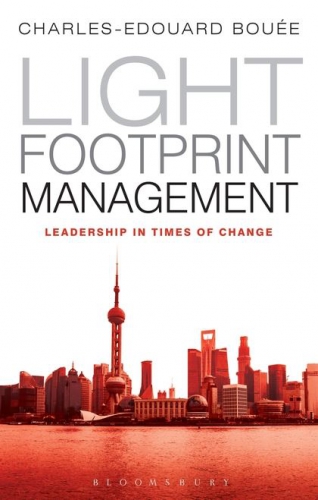 Le président de la Fédération de Russie, Vladimir Poutine, a dénoncé, lors de sa conférence de presse annuelle, jeudi, les visées impérialistes de l'Occident et ses pratiques hégémoniques. «Nos partenaires ont décidé qu'ils étaient les vainqueurs, qu'ils étaient désormais un empire et que les autres étaient des vassaux qu'il faut faire marcher au pas», a-t-il fustigé. Il a accusé les Occidentaux, Etats-Unis en tête, de vouloir «arracher les crocs et les griffes de l'ours russe». 25 ans après la chute du mur de Berlin, ils dressent, selon lui, un nouveau mur entre la Russie et l'Europe. «Il s'agit d'un mur virtuel, mais il commence déjà à être construit», a déclaré le chef de l'État, rappelant l'élargissement de l'Otan jusqu'aux portes de la Russie (pays baltes) et le bouclier antimissile en Europe orientale.
Le président de la Fédération de Russie, Vladimir Poutine, a dénoncé, lors de sa conférence de presse annuelle, jeudi, les visées impérialistes de l'Occident et ses pratiques hégémoniques. «Nos partenaires ont décidé qu'ils étaient les vainqueurs, qu'ils étaient désormais un empire et que les autres étaient des vassaux qu'il faut faire marcher au pas», a-t-il fustigé. Il a accusé les Occidentaux, Etats-Unis en tête, de vouloir «arracher les crocs et les griffes de l'ours russe». 25 ans après la chute du mur de Berlin, ils dressent, selon lui, un nouveau mur entre la Russie et l'Europe. «Il s'agit d'un mur virtuel, mais il commence déjà à être construit», a déclaré le chef de l'État, rappelant l'élargissement de l'Otan jusqu'aux portes de la Russie (pays baltes) et le bouclier antimissile en Europe orientale.
 del.icio.us
del.icio.us
 Digg
Digg

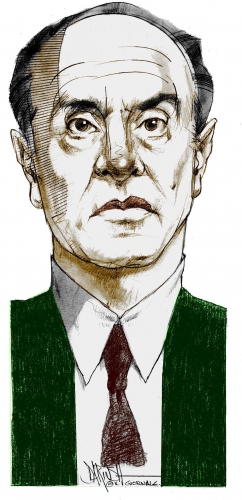 «
« «Una persona che parlava di tutto e di tutti, sino al limite del pettegolezzo e raccontando barzellette, come un vecchio amico, senza prosopopea e saccenteria o atteggiamenti da ”guru”. Almeno con me non aveva alcuna cadenza o inflessione “alla romana”, pur essendo nato e cresciuto nella capitale con qualche viaggio da ragazzino a Cinisi, il paese di origine dei suoi dove ancora esiste la casa avita. Al massimo arrotava “alla siciliana” la “r” iniziale delle parole essendo vissuto in una famiglia di quelle origini. Insomma, tutt’altro che il personaggio che emerge da altri ricordi. Ad esempio, un amico, che “evoliano” non è, mi ha raccontato che andando a trovarlo insieme ad un devoto del suo pensiero, questi, entrato nella sua stanza, si prosternò al suolo e quindi assorbì in silenzio i precetti un po’ assurdi e fuori del tempo che Evola gli dettava! Non posso pensare che questo amico si sia inventato tutto. Viceversa, una volta ad altri che erano recati da lui con spirito troppo superficiale, alla fine li congedò, come ha ricordato Renato Del Ponte, regalando oro una copia di Tex, il fumetto western allora (e oggi) il più longevo e diffuso, come dire, secondo me: siete più adatti a questo genere di letture. A buon intenditor…».
«Una persona che parlava di tutto e di tutti, sino al limite del pettegolezzo e raccontando barzellette, come un vecchio amico, senza prosopopea e saccenteria o atteggiamenti da ”guru”. Almeno con me non aveva alcuna cadenza o inflessione “alla romana”, pur essendo nato e cresciuto nella capitale con qualche viaggio da ragazzino a Cinisi, il paese di origine dei suoi dove ancora esiste la casa avita. Al massimo arrotava “alla siciliana” la “r” iniziale delle parole essendo vissuto in una famiglia di quelle origini. Insomma, tutt’altro che il personaggio che emerge da altri ricordi. Ad esempio, un amico, che “evoliano” non è, mi ha raccontato che andando a trovarlo insieme ad un devoto del suo pensiero, questi, entrato nella sua stanza, si prosternò al suolo e quindi assorbì in silenzio i precetti un po’ assurdi e fuori del tempo che Evola gli dettava! Non posso pensare che questo amico si sia inventato tutto. Viceversa, una volta ad altri che erano recati da lui con spirito troppo superficiale, alla fine li congedò, come ha ricordato Renato Del Ponte, regalando oro una copia di Tex, il fumetto western allora (e oggi) il più longevo e diffuso, come dire, secondo me: siete più adatti a questo genere di letture. A buon intenditor…».


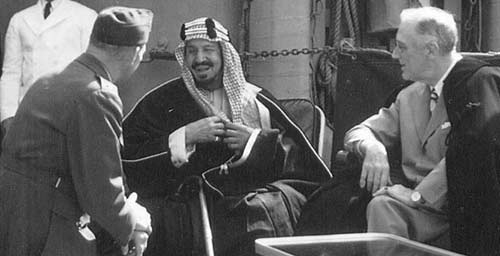
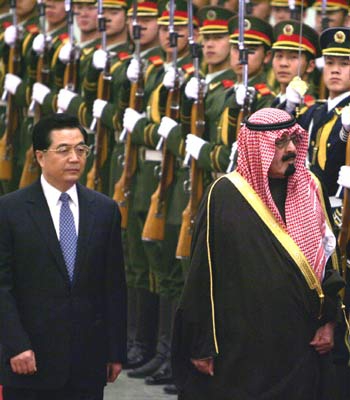 The Saudis have signaled their displeasure in some subtle and some blatant ways in recent years. Perhaps most spectacularly, the Saudis
The Saudis have signaled their displeasure in some subtle and some blatant ways in recent years. Perhaps most spectacularly, the Saudis 

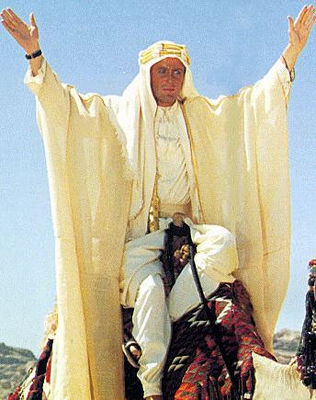 Na het uitbreken van de Eerste Wereldoorlog werd Lawrence, die Arabisch sprak, ingezet bij het organiseren van sabotage-acties tegen de bovengenoemde spoorweg. Het doel was om het Arabische schiereiland los te weken van het Ottomaanse Rijk. Om die reden was ook voorzien in een Arabische opstand. Daarvoor werd de meest agressieve en martiale stam uitgekozen, de Sauds. De Sauds waren aanhangers van het Wahabisme, een back-to-basics vorm van Islam, die zeer sober en orthodox was en beter pastte bij de woestijn dan bij het grootstedelijke leven in het Ottomaanse Rijk.
Na het uitbreken van de Eerste Wereldoorlog werd Lawrence, die Arabisch sprak, ingezet bij het organiseren van sabotage-acties tegen de bovengenoemde spoorweg. Het doel was om het Arabische schiereiland los te weken van het Ottomaanse Rijk. Om die reden was ook voorzien in een Arabische opstand. Daarvoor werd de meest agressieve en martiale stam uitgekozen, de Sauds. De Sauds waren aanhangers van het Wahabisme, een back-to-basics vorm van Islam, die zeer sober en orthodox was en beter pastte bij de woestijn dan bij het grootstedelijke leven in het Ottomaanse Rijk.
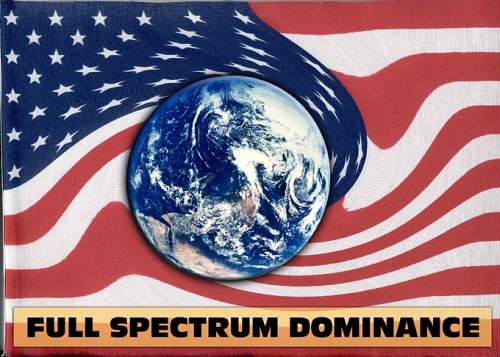
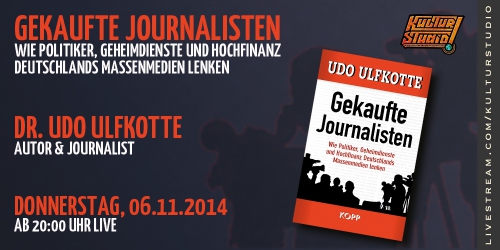
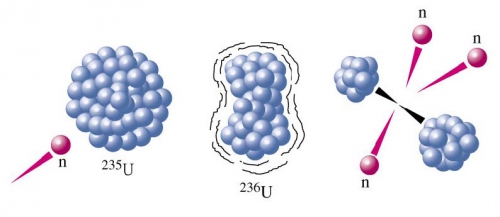
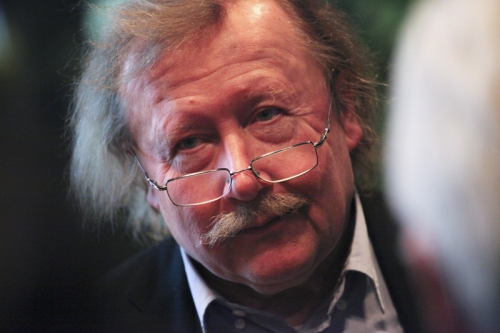
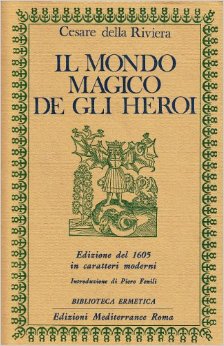 I discovered this fascinating little article by Alexander Dugin. I found it particularly interesting because this intriguing and mystical Hermetic work from Renaissance Italy, Il mondo magico de gli heroi – or The Magical World of the Heroes , authored by Cesare della Riviera – is referred to extensively in a couple of books I have had the pleasure to read recently, one for entertainment, the other for serious study: the esoteric author Joscelyn Godwin's curious little novel The Forbidden Book (certainly recommended, despite the portrayal of the radical traditionalist right as villains), and Julius Evola's The Hermetic Tradition. I assume that the latter work would be known to anyone on here claiming an interest in Evola's esotericism.
I discovered this fascinating little article by Alexander Dugin. I found it particularly interesting because this intriguing and mystical Hermetic work from Renaissance Italy, Il mondo magico de gli heroi – or The Magical World of the Heroes , authored by Cesare della Riviera – is referred to extensively in a couple of books I have had the pleasure to read recently, one for entertainment, the other for serious study: the esoteric author Joscelyn Godwin's curious little novel The Forbidden Book (certainly recommended, despite the portrayal of the radical traditionalist right as villains), and Julius Evola's The Hermetic Tradition. I assume that the latter work would be known to anyone on here claiming an interest in Evola's esotericism.


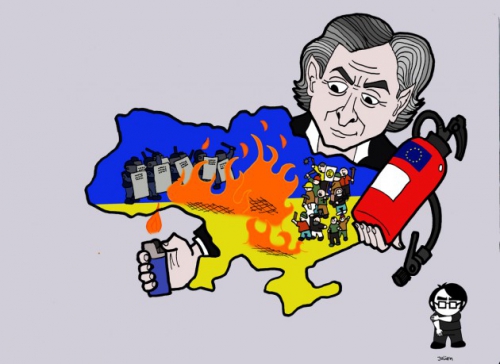


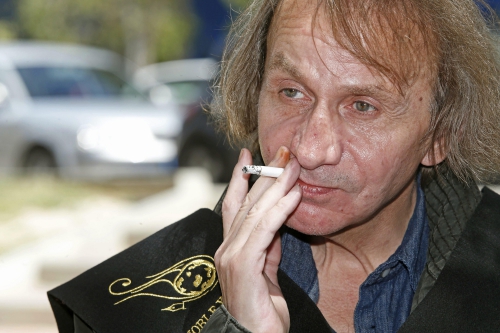
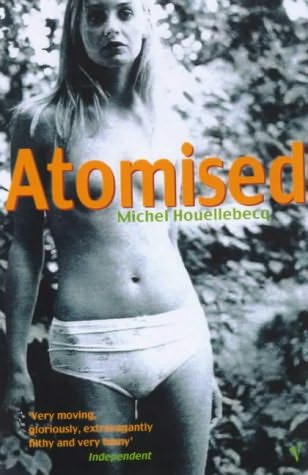 The book (translated into English as Atomized) tells us about the life of famous biologist Michel Djersinski, who mysteriously disappears in the twenty-first century after having plotted the path to a new level of human consciousness. Djersinski’s world i
The book (translated into English as Atomized) tells us about the life of famous biologist Michel Djersinski, who mysteriously disappears in the twenty-first century after having plotted the path to a new level of human consciousness. Djersinski’s world i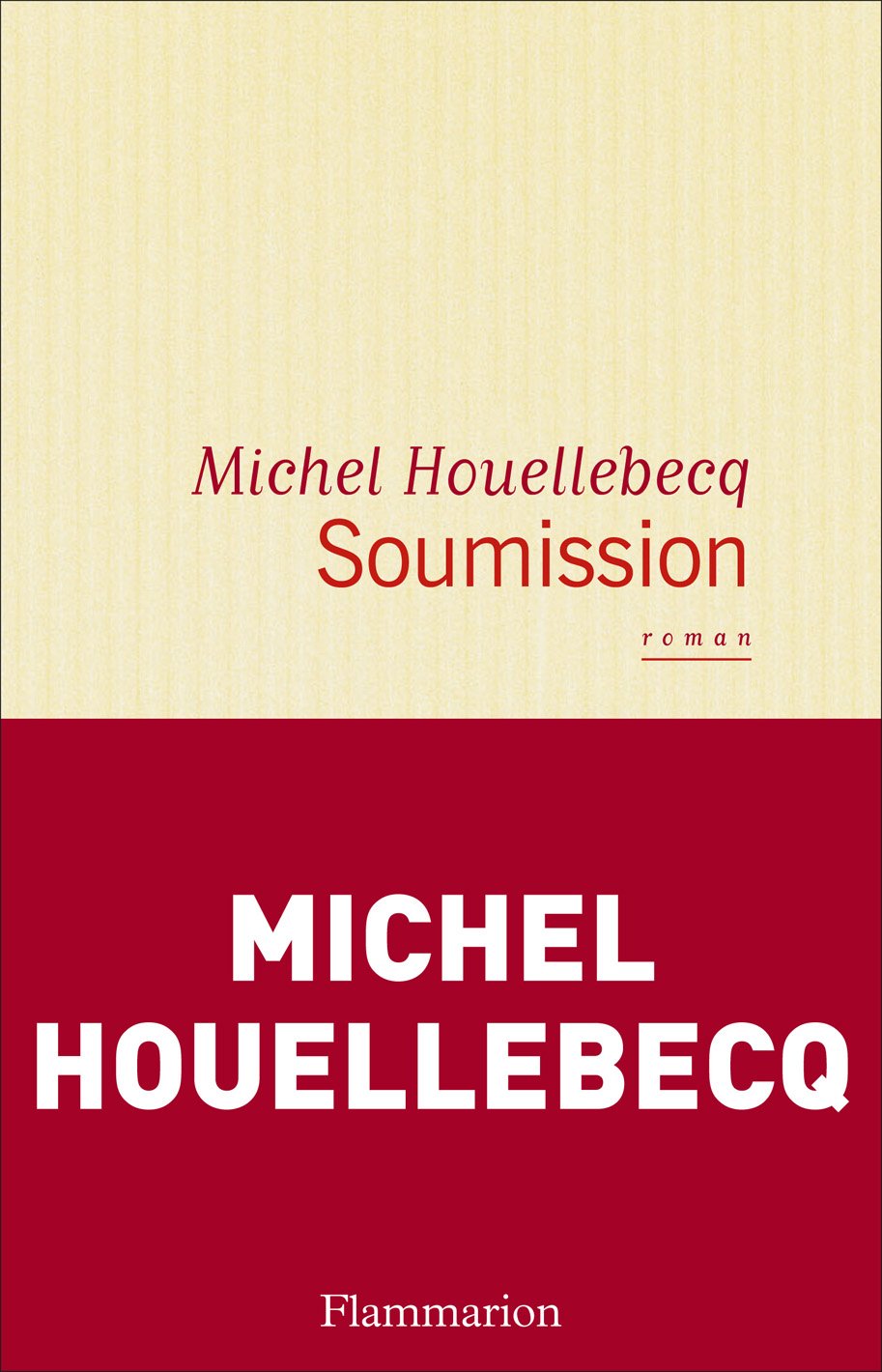
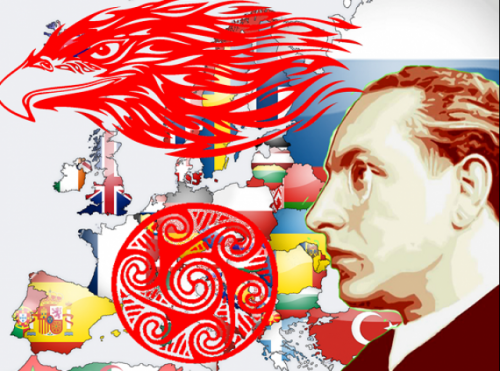
 Evola hace notar que existe una corriente de pensamiento y una historiografía cuya característica es presentar el proceso anterior, al menos en sus primeras fases, como una conquista positiva. "Desde el siglo de las luces y cierto liberalismo", dice, "hasta el historicismo inmanentista, primero idealista, luego materialista y marxista, estas fases de disolución han sido interpretadas y exaltadas como una emancipación del Hombre, un progreso y un verdadero humanismo". En los tiempos en que nosotros vivimos, señala Evola, la ruptura metafísica y moral ha pasado ya al plano existencial. Hoy "una buena parte de la humanidad occidental encuentra normal que la existencia esté desprovista de todo verdadero significado y que no deba ser ligada a ningún principio superior, aunque se las ha arreglado para vivirla de la forma más soportable y menos desagradable posible. Sin embargo, esto tiene como contrapartida inevitable una vida interior cada vez más reducida, inestable y huidiza, así como la desaparición de toda rectitud y fuerza moral". Un sistema de anestésicos y compensaciones (el sexo banalizado, el alcohol, las drogas, las diversiones, el consumismo, los medios de masas) trata de suplir y tapar la falta de significado y de valor de una vida abandonada a sí misma. Sin embargo, cuando dicho entramado se tambalea por alguna razón aparece "la náusea, el asco, el vacío y el absurdo de toda esta nueva civilización materialista impuesta por toda la Tierra". En aquellos cuya sensibilidad es más aguda se constatan diversas formas de traumatismo interior y se ven aparecer estados de degradación y alineación existenciales. Especialmente significativa por lo que tiene de signo de los tiempos es la situación de la juventud 'perdida' o 'quemada' de hoy.
Evola hace notar que existe una corriente de pensamiento y una historiografía cuya característica es presentar el proceso anterior, al menos en sus primeras fases, como una conquista positiva. "Desde el siglo de las luces y cierto liberalismo", dice, "hasta el historicismo inmanentista, primero idealista, luego materialista y marxista, estas fases de disolución han sido interpretadas y exaltadas como una emancipación del Hombre, un progreso y un verdadero humanismo". En los tiempos en que nosotros vivimos, señala Evola, la ruptura metafísica y moral ha pasado ya al plano existencial. Hoy "una buena parte de la humanidad occidental encuentra normal que la existencia esté desprovista de todo verdadero significado y que no deba ser ligada a ningún principio superior, aunque se las ha arreglado para vivirla de la forma más soportable y menos desagradable posible. Sin embargo, esto tiene como contrapartida inevitable una vida interior cada vez más reducida, inestable y huidiza, así como la desaparición de toda rectitud y fuerza moral". Un sistema de anestésicos y compensaciones (el sexo banalizado, el alcohol, las drogas, las diversiones, el consumismo, los medios de masas) trata de suplir y tapar la falta de significado y de valor de una vida abandonada a sí misma. Sin embargo, cuando dicho entramado se tambalea por alguna razón aparece "la náusea, el asco, el vacío y el absurdo de toda esta nueva civilización materialista impuesta por toda la Tierra". En aquellos cuya sensibilidad es más aguda se constatan diversas formas de traumatismo interior y se ven aparecer estados de degradación y alineación existenciales. Especialmente significativa por lo que tiene de signo de los tiempos es la situación de la juventud 'perdida' o 'quemada' de hoy. Al analizar la situación del arte moderno, Evola subraya sus tendencias morbosas e intimistas, que dan la espalda al plano sobre el que actúan las grandes fuerzas históricas y políticas y se retiran al mundo de la subjetividad privada del artista no dando valor más que a lo psicológico y a lo formalmente 'interesante'. Joyce, Proust o Gide son, en la literatura, ejemplos acabados de esta tendencia. En ocasiones a esta orientación se asocia la idea del 'arte puro', esto es, del mero formalismo rodeando a un contenido más o menos insignificante. Las innumerables vanguardias e ismos no tienen mucho más valor, afirmación que resulta significativa en la pluma de alguien como Evola, que fue una de las figuras señeras del dadaísmo pictórico italiano. El significado de estas vanguardias "se reduce a una revuelta estéril, reflejo del proceso general de disolución. Reflejan el estado de crisis, pero no aportan nada constructivo, estable o duradero". Su recorrido, además, es corto. Pronto acaban convertidas en un nuevo 'academicismo', una nueva convención, y entran como un producto de consumo más en los circuitos comerciales. En el fondo el arte de hoy, separado de todo contexto orgánico y necesario, se ve reducido al absurdo, convertido en un artículo de lujo para parásitos ociosos. "Si se consideran objetivamente los procesos en curso", observa Evola, "se siente nítidamente que el arte ya no tiene porvenir, que su posición es cada vez más marginal con respecto a la existencia y que su valor se reduce al de un artículo de gran lujo". Al asomarse a la literatura, el panorama no es mejor. "Su fondo constante es el fetichismo de las relaciones humanas, de los problemas sentimentales, sexuales o sociales de individuos sin importancia". Se ha impuesto un realismo inferior, corrosivo y derrotista, denuncia Evola, en el que "directa o indirectamente se mina todo ideal, se hace mofa de todo principio y se reducen los valores estéticos, lo justo, lo verdaderamente noble y digno a simples palabras; y todo ello sin obedecer siquiera a una tendencia declarada". Frente a este realismo inferior Evola postula un realismo positivo que afirma la existencia de valores "que para el tipo humano diferenciado no se reducen a ficciones ni fantasías, sino que tienen el valor de realidades absolutas. Entre éstas figuran el coraje espiritual, el honor, la rectitud, la veracidad o la fidelidad. Una existencia humana que ignora esto no es plenamente real, es infrarreal. Para el Hombre diferenciado, a pesar de la disolución presente, estos valores siguen siendo intocables".
Al analizar la situación del arte moderno, Evola subraya sus tendencias morbosas e intimistas, que dan la espalda al plano sobre el que actúan las grandes fuerzas históricas y políticas y se retiran al mundo de la subjetividad privada del artista no dando valor más que a lo psicológico y a lo formalmente 'interesante'. Joyce, Proust o Gide son, en la literatura, ejemplos acabados de esta tendencia. En ocasiones a esta orientación se asocia la idea del 'arte puro', esto es, del mero formalismo rodeando a un contenido más o menos insignificante. Las innumerables vanguardias e ismos no tienen mucho más valor, afirmación que resulta significativa en la pluma de alguien como Evola, que fue una de las figuras señeras del dadaísmo pictórico italiano. El significado de estas vanguardias "se reduce a una revuelta estéril, reflejo del proceso general de disolución. Reflejan el estado de crisis, pero no aportan nada constructivo, estable o duradero". Su recorrido, además, es corto. Pronto acaban convertidas en un nuevo 'academicismo', una nueva convención, y entran como un producto de consumo más en los circuitos comerciales. En el fondo el arte de hoy, separado de todo contexto orgánico y necesario, se ve reducido al absurdo, convertido en un artículo de lujo para parásitos ociosos. "Si se consideran objetivamente los procesos en curso", observa Evola, "se siente nítidamente que el arte ya no tiene porvenir, que su posición es cada vez más marginal con respecto a la existencia y que su valor se reduce al de un artículo de gran lujo". Al asomarse a la literatura, el panorama no es mejor. "Su fondo constante es el fetichismo de las relaciones humanas, de los problemas sentimentales, sexuales o sociales de individuos sin importancia". Se ha impuesto un realismo inferior, corrosivo y derrotista, denuncia Evola, en el que "directa o indirectamente se mina todo ideal, se hace mofa de todo principio y se reducen los valores estéticos, lo justo, lo verdaderamente noble y digno a simples palabras; y todo ello sin obedecer siquiera a una tendencia declarada". Frente a este realismo inferior Evola postula un realismo positivo que afirma la existencia de valores "que para el tipo humano diferenciado no se reducen a ficciones ni fantasías, sino que tienen el valor de realidades absolutas. Entre éstas figuran el coraje espiritual, el honor, la rectitud, la veracidad o la fidelidad. Una existencia humana que ignora esto no es plenamente real, es infrarreal. Para el Hombre diferenciado, a pesar de la disolución presente, estos valores siguen siendo intocables".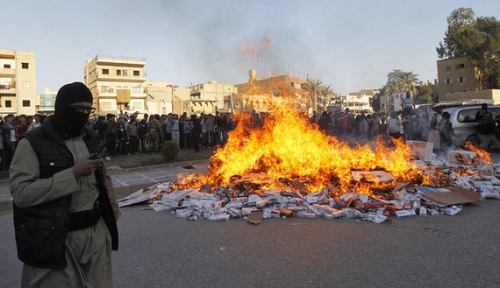
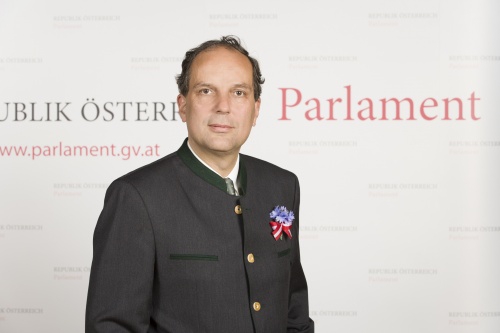
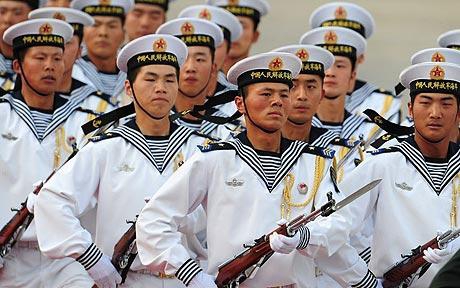 Q. : La Chine craint d’être encerclée par les Etats-Unis ; Washington cherche à installer un système antimissiles en Asie orientale, sous le prétexte du danger nord-coréen. Dans quelle mesure ces plans pourront-ils contribuer à envenimer le climat dans l’espace Asie-Pacifique ?
Q. : La Chine craint d’être encerclée par les Etats-Unis ; Washington cherche à installer un système antimissiles en Asie orientale, sous le prétexte du danger nord-coréen. Dans quelle mesure ces plans pourront-ils contribuer à envenimer le climat dans l’espace Asie-Pacifique ?